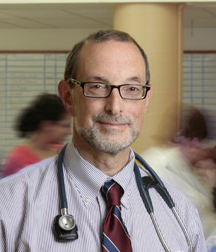TALLAHASSEE, Florida – A dozen years after becoming one of only four U.S. medical schools to devote an entire academic department to geriatric medicine, the Florida State University College of Medicine is naming a new chair for that department.
Paul Katz, currently vice president of medical services and chief of staff for Baycrest Geriatric Health Care System in Toronto, Canada, will replace Kenneth Brummel-Smith in May. Brummel-Smith has served as the first and only chair of the department since the school’s founding.
Brummel-Smith will continue in his role until Katz’s arrival, and then will remain on the faculty, focusing on teaching, research and advocacy in aging-related issues.
“I am very pleased that Dr. Katz Is joining us to help us further our mission of training future physicians who will be responsive to and understand the needs of the aging patient,” said J. Fogarty, FSU College of Medicine dean.
“With his clinical and teaching skills, national reputation for excellence, and superb academic credentials, he is the perfect person to lead our geriatrics department into the future."
Brummel-Smith arrived as a past president of the American Geriatrics Society, and Katz brings outstanding qualifications to the position as well.
Among other achievements, he is past president of the American Medical Directors Association, the national association of professionals practicing long-term care medicine committed to the continuous improvement of patient care.
Katz, a widely published author and noted speaker on aging issues, also currently is a professor in the Department of Medicine at the University of Toronto. He previously served as chief of the Division of Geriatrics/Aging at the University of Rochester School of Medicine and for 16 years was medical director at Monroe Community Hospital, a highly regarded academic nursing home in Rochester, N.Y.
”I feel incredibly fortunate to have the opportunity to work with the stellar faculty that comprise the Department of Geriatrics and help build upon their many great accomplishments,” Katz said. “FSU is truly unique in recognizing the importance of geriatrics to the well-being of society as a whole. The university not only demonstrates how young physicians can successfully be taught the core principles of geriatrics but, importantly, how such knowledge is translated into high-quality care at the bedside.
“I am looking forward to being part of this process as well as further integrating the Department of Geriatrics into the community.”
Katz also spent five years as chief of staff for research at the Canandaigua Veterans Administration Medical Center and Rochester VA Clinic.
He graduated with an M.D. from the University of Michigan, where he was a member of Alpha Omega Alpha Medical Honor Society, and completed a geriatric medicine fellowship from SUNY Buffalo at the VA Medical Center in Buffalo, N.Y.
Katz is co-editor of the textbook Practice of Geriatrics and Psychiatry in Long-Term Care and is a senior editor for the Springer Series: Advances in Long-Term Care. One of his co-editors is Marshall Kapp, director of Florida State’s Center for Innovative Collaboration in Medicine and Law.
“I've known Paul for 30 years,” Kapp said. “Through his scholarship, organizational leadership, and example he has been and continues to be a key figure in the national education of medical students and physicians to care competently and compassionately for older people, especially in the long-term care context.”
Katz currently is co-lead investigator on a $3 million grant from the Ontario Ministry of Health and Long-Term Care to create a new nursing home-focused Centre for Learning, Research and Innovation. He also previously held grants totaling more than $6 million from the National Institutes of Health, the U.S. Veterans Administration and the Health Resource Service Administration (HRSA).
Paul Katz (photo courtesy of Baycrest Geriatric Health Care System)


